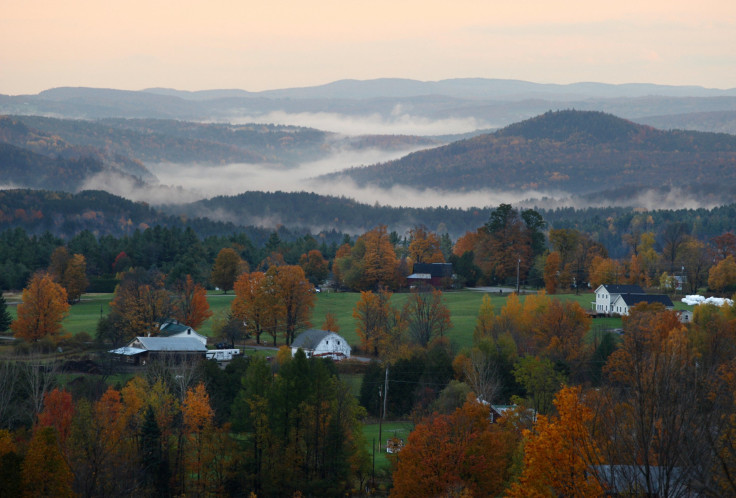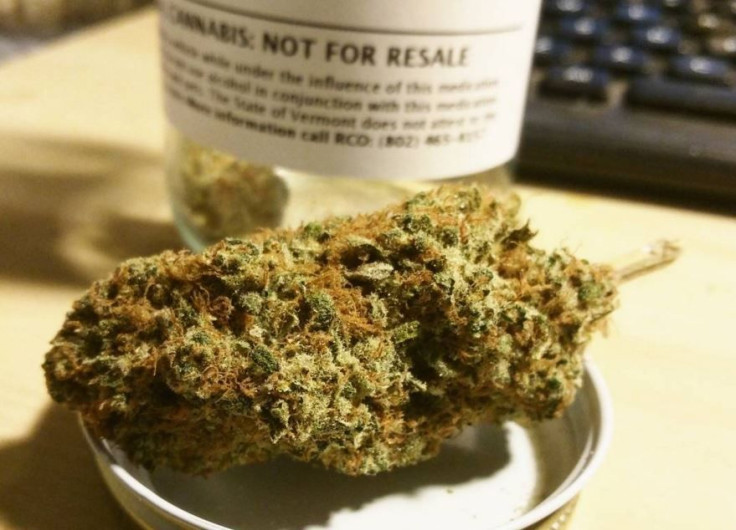Marijuana Legalization: Should Bernie Sanders’ Home State Embrace Socialized Cannabis?

As one of Vermont’s approximately 2,500 official medical marijuana patients, Robert Gwynn is excited his state lawmakers are considering legalizing cannabis. Born with neurofibromatosis type 1, a tumor disorder that has left him with debilitating nerve pain, limited appetite and ongoing fatigue, the 31-year-old has been part of the state’s medical marijuana program for the past two years. Medical marijuana, he says, has helped him halve his 14-pill-a-day pharmaceutical regimen, which had left him so mentally disconnected from reality he was afraid to drive. But he thinks a recreational market could encourage the sort of competition, proficiency and price constraints lacking in the state’s current system of four nonprofit dispensaries statewide. Once a month, Gwynn drives to a dispensary in Brandon, a four-hour round-trip drive from where he lives in Brattleboro, since he says the medicine quality and patient care at the dispensary 10 minutes from his house are so poor, he won’t shop there.
If Vermont legalizes marijuana, Gwynn figures it will look similar to programs up and running in Colorado, Washington state and Oregon, where for-profit businesses produce and sell marijuana. He hasn’t noticed anyone proposing alternatives. “I haven’t really heard it come up,” he says. “When people talk about it, I don’t think it is something that comes to mind.”
Gwynn isn’t the only one who assumes legalized marijuana in Vermont, which could occur in coming months, will resemble cannabis markets elsewhere. But drug policy experts say the state is perfectly positioned to go in a bold new direction, one that challenges widely held assumptions about the country’s mounting marijuana movement. Among those options could be a state-run system similar to how Vermont controls the sale of hard liquor within its borders. Alternatives like this could limit the public health impacts of a marijuana market while still generating state revenue — that is, if lawmakers are willing to consider them. And if Vermont isn’t willing to deviate from the path set by legalization efforts that came before it, does that mean the only realistic U.S. cannabis model moving forward is a free-market free-for-all?

With recent encouragement from both a former state attorney general and Gov. Peter Shumlin, Vermont lawmakers are actively considering becoming the fifth state (not counting Washington, D.C.) to legalize marijuana, building on a medical marijuana law the state passed in 2004 and a dispensary system it launched in 2011. The state’s Senate Judiciary Committee is in the midst of three weeks of in-depth testimony and statewide public hearings on the issue, with the goal of voting Friday on whether to advance a legalization bill. “I’m impressed,” says Matt Simon, New England political director for the Marijuana Policy Project, who’s based in Vermont. “I’ve been studying this issue for 20 years, and here you have politicians sitting in rooms, asking the right questions and trying to understand it for the first time in my life.”
If such a bill passes in the near future, Vermont would become the first state in New England, much less the entire Northeast, to legalize marijuana. While just 626,000 people live in Vermont, the second least populated state in the country, roughly 2.7 million regular marijuana users live within 200 miles of the state, including those in New York City. That means whatever legalized marijuana system Vermont chooses could have financial and political impacts far beyond its modest borders.
Because Vermont does not have a ballot initiative system like many states, the only way it can legalize marijuana is through the legislative process. And if it does so this legislative session, it will be the first time marijuana ever has been legalized by lawmakers, not voters. According to some experts, this means Vermont has the option of considering legalization models not likely to be floated at the polls. “The initiative process is going to be driven by folks who want something to happen, who want legalization,” says Pat Oglesby, a tax attorney who studies marijuana at the Center for New Revenue in North Carolina. “The legislative process could result in a more moderate, middle-ground approach.”
It’s why last year a Rand Corp. legalization study commissioned by the state for $20,000 (the rest of the study’s $120,000 price tag was covered by the philanthropic foundation Good Ventures) urged lawmakers to consider “that marijuana policy should not be viewed as a binary choice between prohibition and the for-profit commercial model we see in Colorado and Washington.” Instead, the report’s authors, a who’s who of drug policy authorities nationwide, laid out a series of alternatives, including a nonprofit-only system, a supply chain overseen by a public authority similarly to how the Vermont State Housing Authority manages affordable housing initiatives and a market only open to “benefit corporations,” or b-corporations, that have positive social impact. But the report focused special attention on one option in particular: a government-run monopoly model where the state controls marijuana production and distribution.
According to experts, a state-run marijuana system could have several benefits. For starters, government-run cannabis outlets wouldn’t have the same sort of financial incentive to promote excessive marijuana consumption similar to how alcohol companies market to heavy users. Instead, government marijuana outlets could focus on the sort of social protections that are a top priority for Shumlin. “You would like a system where nobody has an incentive to encourage overuse of a drug,” says New York University marijuana policy expert Mark Kleiman. “State-monopoly retailing could be a better option if the state officials involved didn’t have any incentive to encourage problematic drug use and even better if they had a responsibility to discourage it.” Reviews of private versus state-run alcohol systems have found “strong evidence that privatization results in increased per capita alcohol consumption, a well-established proxy for excessive consumption and related harms.”
State stores also wouldn’t be tied to the same market constraints as a free-enterprise system. “State stores can enter into a price war with the black market with a lot more flexibility,” says Oglesby, co-author of the Rand report. Government-run operations could also keep rates artificially inflated to avoid the temptingly cheap prices we now see with soda and junk food.

There’s another reason state-run marijuana shops could make sense for Vermont: Such a system already exists there for hard alcohol. At the end of Prohibition in 1933, it was one of many states that launched state-run liquor stores, following John D. Rockefeller Jr.’s argument that “only as the profit motive is eliminated is there any hope of controlling the liquor traffic in the interest of a decent society.” (In 1996, Vermont shifted to an agency system where privately owned retailers contract with the state.)
Finally, there’s the fact that Bernie Sanders, the Vermont senator running for the Democratic presidential nomination, has become the country’s most prominent self-described socialist. While his opponent Hillary Clinton has indicated she’d loosen marijuana restrictions, Sanders has gone further, proposing to lift the federal cannabis ban altogether. Wouldn’t it make sense, then, for his home state to embrace socialized cannabis? (The Sanders campaign didn’t respond to a phone call requesting comment on legalization efforts in Vermont.)
But now, as Vermont lawmakers narrow possible legalization, there’s little indication the state will deviate significantly from legalization efforts that came before. One of two legalization bills being considered by the state judiciary committee (it will likely end up voting on a hybrid bill containing elements of both) would provide licensing preferences to the sort of b-corporations detailed in the Rand report. But the bill’s author, Democratic state Sen. David Zuckerman, says the other alternatives proposed in last year's report are likely political nonstarters. “I think the extremes on both ends — straight unfettered capitalism and a government-run monopoly — are off the table,” says Zuckerman, adding, he believes the chances of a legalization bill passing this year “are a little better than 50-50.”
Some observers are disappointed. “It’s kind of surprising,” says Dan Rifle, Marijuana Policy Project’s former federal policy director, who left the organization over concerns industry interests were taking over the marijuana movement. “If there’s any state where this should be happening, it’s Vermont. They commissioned a report, and no one seems to have read it.”
But others say options like a state-controlled system aren’t being considered because they don’t make sense. Government-run programs such as this are prone to bureaucratic bloat, and, as MPP's Simon points out, anyone who’s seen the billboards just over New Hampshire's state lines advertising the Granite State's tax-free alcohol stores knows government-controlled outlets can still promote heavy use. Plus, adds Simon, there’s no indication the legalization models already up and running are broken, so why bother fixing them? “We could spend years discussing hypothetical models, but that would be missing the fact that Vermonters are spending hundreds of millions of dollars in the worst possible marijuana model right now,” he says. “We want to move this from the illicit market, and Colorado and Oregon and Washington have already shown that can be done in a responsible fashion.”
It doesn’t help no one at the Vermont State House is advocating for alternative legalizative approaches. There are multiple pro-marijuana contingents in the debate, including the Vermont Coalition to Regulate Marijuana, an advocacy group backed by MPP; the Vermont Cannabis Collaborative, a group of local entrepreneurs who boast the governor’s former chief of staff as their chief lobbyist; and Vermont Home Grown, a coalition of patients and small-scale producers. And while each has a slightly different agenda, all are interested in some version of a free-market model. “No one is in favor of state-run,” says Fran Janik, a representative of Vermont Home Grown. “ We want an unlimited system for business and we want a for-profit system for the small farmer. We are focused on allowing a 100 square-foot grow for every Vermonter.”
Not even anti-marijuana advocates seem interested in advocating for a state-run system even though their lobbying efforts are increasingly focused on the dangers of big industry taking over marijuana markets. “Of course there are more responsible and less responsible models of legalization, but the moment you embrace the more responsible model, the industry comes in and you are taken out of context and it is used against you,” says Kevin Sabet, founder of Smart Approaches to Marijuana, a major anti-legalization group with a chapter in Vermont.
But likely the biggest reason of all options like a state-run program aren’t getting more attention is that many people worry having state workers sell marijuana would put Vermont on a collision course with the federal government. “If you are thinking about this from a public-health perspective and are still trying to bring in state revenue, the approach that probably makes the most sense is the government monopoly,” says Beau Kilmer, co-director of Rand’s Drug Policy Research Center and co-author of the Vermont report. “However, because of the government prohibition, most states aren’t really talking about this because they don’t want to put their employees at risk of arrest.”
Government employees in states with medical or recreational marijuana programs are already running afoul of federal law by regulating, taxing and collecting revenues from marijuana. And one local jurisdiction — the city of North Bonneville in Washington state — has been running a government-owned marijuana shop for nearly a year without any blowback.
Still, between such legal questions and the lack of political will around the issue, it’s easy to understand why a state-run marijuana system and other alternatives aren’t getting more airtime as Vermont moves ever closer to recreational marijuana. Some experts say that’s too bad, since the state might offer one of the last best chances to take a hard look at what, exactly, legalized marijuana has to look like. “It could matter enormously if Vermont does something that nobody else does,” says Kleiman. “But if it doesn’t, and California goes the commercial marijuana route this year, as it probably will, then it might be too late. When Congress gets around to legalizing cannabis, you won’t be able to consider models that aren’t focused on commercial production because the commercial interests involved will dominate the political process.”
That’s okay, say some Vermonters, including Gwynn. The medical marijuana patient spent enough time navigating Vermont’s ruined roadways in the wake of 2011’s Hurricane Irene to be wary of placing too much responsibility in the hands of the government. “I would much rather have private, for-profit small businesses who want to grow marijuana in small high-quality batches than have a state store where everything has to go through a long process to be sold,” he says. “That could slow things down.”
© Copyright IBTimes 2024. All rights reserved.












